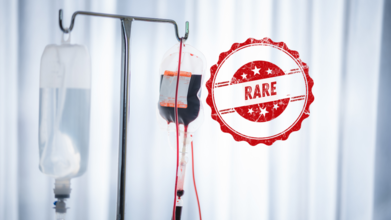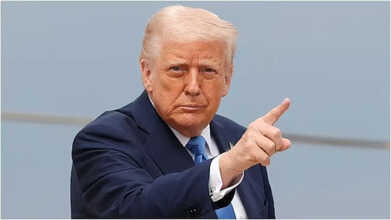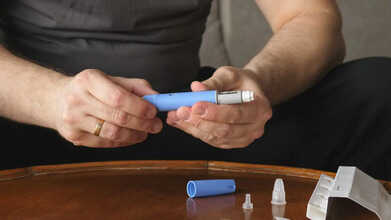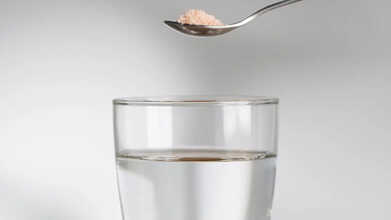- Health Conditions A-Z
- Health & Wellness
- Nutrition
- Fitness
- Health News
- Ayurveda
- Videos
- Medicine A-Z
- Parenting
- Web Stories
Not O, Not AB— This Indian Woman Has A Rare Blood Type 'CRIB' With No Matches Worldwide

Credits: Canva
In what is being hailed as a groundbreaking moment in global transfusion medicine, a 38-year-old woman from Karnataka, India, has been identified as the first known carrier of a previously undocumented human blood group, now officially named CRIB. This unprecedented finding came to light when she was admitted to R.L. Jalappa Hospital in Kolar for heart surgery in 2023.
Though she was originally typed as O-positive, her blood didn’t behave like it. It reacted with every test sample available in the lab—something known as being panreactive. That raised immediate red flags among her physicians. No compatible donor could be found, even among 20 of her closest family members. Despite the risk, the surgical team completed her cardiac procedure without a transfusion—a decision that would later prove critical in her survival and in medical history.
What followed was a medical investigation that spanned continents. Her blood sample was sent to the International Blood Group Reference Laboratory (IBGRL) in Bristol, UK—one of the world’s leading institutions in blood group identification. There, a team of transfusion scientists spent 10 months conducting molecular and serological analyses to crack the case.
Finally, they concluded that her blood carried an unknown antigen—a marker on red blood cells that typically determines compatibility for transfusions. The antigen didn’t match anything in the 43 existing blood group systems recognized by the International Society of Blood Transfusion (ISBT).
A new antigen was identified within the Cromer blood group system, which involves proteins called decay-accelerating factor (DAF) on red cells. To honor the origin of the discovery, scientists named the antigen CRIB, an acronym combining Cromer, India, and Bengaluru.
What Is the CRIB Blood Group?
The CRIB blood group represents a rare antigen profile within the Cromer system. In most people, antigens in this group are present on DAF proteins. But in the CRIB case, the woman lacked a high-prevalence antigen commonly found in the general population, causing her immune system to react to every available donor blood type—even O-positive.
This made the woman’s blood functionally unique. Anyone with this blood type would need extremely rare, CRIB-negative blood in the case of transfusion—currently, there’s no known matching donor worldwide.
This isn’t just a medical oddity—it has far-reaching consequences for how we approach blood donation, transfusion safety, and immunogenetics.
Also Read: What is Glioma? Walking Dead Actress Kelly Mack Dies at 33 After Battling Rare Brain Cancer
The CRIB blood group challenges conventional systems used for blood typing and compatibility. It underscores how standard blood typing is still incomplete, and how gaps in our understanding can be dangerous—especially in emergency surgeries or during pregnancy.
How Is This Blood Type Discovery Affect Pregnancy and Fetal Health?
The discovery of CRIB has serious implications for fetal medicine. Similar to how Rh incompatibility can lead to Hemolytic Disease of the Fetus and Newborn (HDFN), CRIB-positive mothers might develop antibodies that attack the fetus’s red blood cells—if the baby inherits incompatible antigens.
Detecting CRIB in expectant mothers could therefore become critical in preventing miscarriage or fetal complications.
India’s diverse gene pool has previously produced rare blood group discoveries, including INRA (Indian Rare Antigen), first identified in 2017. With CRIB now officially recognised by ISBT, it marks India’s second major contribution to global transfusion science in under a decade.
This elevates the importance of developing a national rare blood registry, and investing in genetic blood screening—not just for patients, but for potential donors.
What Is The Science Behind the Cromer Group?
The Cromer blood group system is one of the more obscure and less commonly tested classifications in blood science. It involves antigens located on the DAF (decay-accelerating factor), which protects blood cells from immune destruction. Variants in these antigens can cause unexpected immune reactions during transfusions.
CRIB appears to represent a novel Cromer antigen—meaning it doesn’t behave like any of the previously documented ones. This puts it in a category of what transfusion scientists call high-prevalence antigen absences, where even a single unit of compatible blood can be hard—or impossible—to find.
In an effort to find a compatible blood donor, doctors collected samples from 20 of her family members. None matched. This confirmed that the antigen pattern was not only rare—it was potentially unique.
The case was handled with meticulous care. According to Dr. Ankit Mathur from the Rotary Bangalore TTK Blood Centre, “Her blood was panreactive, incompatible with all test samples. Recognising this as a possible case of a rare or unknown blood type, we worked closely with international experts and managed the case without transfusion.” Now that CRIB has been added to the official ISBT database, transfusion scientists across the world are advocating for:
- Development of CRIB-specific antibody screening kits
- International rare blood registries to flag potential future donors
- Greater investment in genetic blood typing, especially in populations with diverse ancestry
- Training healthcare professionals to recognise and manage panreactive or atypical cases earlier
The discovery of CRIB is more than a scientific milestone—it’s a reminder of how individual cases can rewrite medical textbooks. One woman’s unusual blood has now become a catalyst for change in how we view transfusion safety, genetics, and global healthcare cooperation.
For now, she remains the only known person in the world with the CRIB blood group but her case has opened the door to more discoveries and potentially, more lives saved.
Cardiologist Warns Donald Trump’s Medicines Could Be Slowing Him Down, Here’s Why

Credits: Canva
Donald Trump Health News: A British cardiologist and adviser to Health Secretary Robert F. Kennedy Jr. has suggested that President Donald Trump may seem “slowed down” because of his medications. Speaking to the European Parliament, Dr. Aseem Malhotra, who works with the lobby group Make America Healthy Again, said the 79-year-old president could be experiencing fatigue from cholesterol-lowering drugs, such as statins, and aspirin. Keep reading to know how.
Cardiologist Suggests Trump’s Medications Could Be Slowing Him Down
A British cardiologist and adviser to Health Secretary Robert F. Kennedy Jr., Dr. Aseem Malhotra, has suggested that President Donald Trump may appear to be slowing down due to his medications. Speaking to the European Parliament at the launch of the health advocacy group Make Europe Healthy Again (MEHA), Malhotra pointed to cholesterol-lowering drugs, or statins, and aspirin as potential contributors to fatigue in the 79-year-old president, as per The Independent.
Statins May Offer Little Benefit for Healthy Seniors
Malhotra noted that Trump takes two cholesterol-lowering medications despite having no history of cardiovascular disease. “If you’re over 75 and have no cardiovascular disease, the benefit of statins is very limited,” he said. “You would have to treat 446 people to prevent a single cardiovascular event, meaning there’s no significant benefit.”
Malhotra, known for his skepticism toward vaccines and statins, has previously been criticized by medical experts for promoting views considered misinformation. He has also been a close ally of Kennedy.
Donald Trump's Health Update
Malhotra’s comments come amid ongoing speculation about Trump’s cognitive and physical health. Observers have pointed to occasional gaffes and name mix-ups as possible signs of cognitive decline. Despite this, the White House maintains that the president is in “excellent overall health,” following a recent routine check-up at Walter Reed Medical Center.
Physical health concerns have also been raised after Trump was frequently photographed with bruising on his right hand. White House officials attribute this to frequent handshakes and his use of aspirin for cardiovascular protection. Earlier this year, the president was diagnosed with chronic venous insufficiency, a common, non-life-threatening condition in older adults that affects blood flow from the legs to the heart.
Statin Side Effects and Trump’s Energy Levels
During his remarks, Malhotra highlighted that cholesterol medications can cause fatigue, muscle pain, and “brain fog.” He suggested that Trump might be experiencing a slight slowdown due to these drugs, in addition to possibly sleeping only four hours a night. Malhotra recommended that the president consider stopping statins and aspirin, saying he would likely feel better within weeks.
COVID-19 Booster and Health Status
Malhotra also commented on Trump receiving an updated COVID-19 booster and a flu shot, calling them unnecessary. “I believe he genuinely took the booster and wasn’t doing it for appearances,” Malhotra said, while also noting that Trump may have fallen victim to medical misinformation.
However, research continues to show that COVID-19 vaccines remain effective, particularly for those over 65. A study by the VA St. Louis Healthcare System involving nearly 300,000 veterans found that last season’s vaccine reduced emergency room visits by 29%, hospitalizations by 39%, and deaths by 64%. Combined, the overall effectiveness was around 28%, similar to flu vaccines, which typically provide 30–60% protection against severe illness.
While statins are not proven to cause dementia, the FDA issued a safety warning in 2012 noting that they can sometimes lead to “notable, but poorly defined memory loss or impairment,” which typically reverses after stopping the medication.
Trump Announces Plans To Cut Ozempic Costs; Doctors Call It A Potential Gamechanger

Credits: Canva
President Donald Trump announced that the cost of Novo Nordisk’s widely used diabetes and weight-loss drug, Ozempic, will be reduced. Speaking at a White House event focused on fertility treatments and drug pricing, Trump said the lower prices would follow prompt negotiations with the pharmaceutical company. “They’ll be much lower,” he told reporters, as per Fox News.
Trump Announces Plans To Cut Ozempic Costs
Novo Nordisk produces both Ozempic and Wegovy, which contain the same active ingredient, semaglutide, but are approved for different purposes. Ozempic, approved in 2017, is primarily used to treat Type 2 diabetes, with weight loss occurring as a side effect. Wegovy, approved four years later, is specifically intended for long-term weight management in adults who are obese or overweight and have at least one weight-related condition, such as high blood pressure or Type 2 diabetes. In recent years, demand for both drugs has surged, especially among people looking to lose weight.
During a Thursday Oval Office news conference focused on in vitro fertilization drugs, President Trump mentioned the idea of lowering prices for other medications, including Ozempic. His Centers for Medicare and Medicaid Administrator, Dr. Mehmet Oz, later cautioned that nothing had been finalized.
“In London, the same drug costs $130, but in New York, it’s $1,300,” Trump said during Thursday’s IVF announcement. “Now, instead of $1,300, people will be paying around $150.”
Still, Trump’s remarks generated significant attention. Patients struggling with the high cost of these drugs expressed hope for more affordable access, while doctors called the potential price reduction “huge for patients.” Wall Street also reacted: shares of Novo Nordisk and Eli Lilly, makers of GLP-1 drugs such as Ozempic, Wegovy, Mounjaro, and Zepbound, dropped sharply, erasing tens of billions of dollars in market value.
Novo Nordisk Shares Fall After Trump’s Comment
Shares of Eli Lilly & Co. and Novo Nordisk dropped in late trading after President Trump suggested that the price of the popular diabetes drug Ozempic could fall to about $150 per month. Currently, the U.S. list price for a month’s supply is around $1,000, with Trump referring to it as “the fat loss drug.” In response, Novo’s American depositary receipts fell up to 4.7 percent, while Lilly’s shares dropped as much as 5.3 percent.
Novo Nordisk has been in discussions about lowering drug costs since Trump sent letters to 17 major pharmaceutical companies urging price cuts. Ozempic and its counterpart, Wegovy, were also selected for price negotiations under the Inflation Reduction Act (IRA).
Most Favored Nation’ Drug Prices
President Trump has recently struck deals with Pfizer, AstraZeneca, and EMD Serono under the ‘Most Favored Nation’ pricing framework, with more agreements promised. These deals offer medicines at Most Favored Nation prices to Medicaid, which already receives substantial discounts, and to certain drugs available directly to consumers without insurance through the TrumpRx platform.
In exchange, pharmaceutical companies receive relief from potential tariffs, provided they continue investing in U.S. manufacturing and research.
Delhi High Court Permits JNTL to Sell ₹180-Crore ORSL Stock Despite FSSAI Dispute

Credits: Canva
The ongoing dispute over the use of “ORS” in beverage branding has escalated, as the Delhi High Court granted interim protection to JNTL Consumer Health (India), producer of the popular hydration drink ORSL.
Meanwhile, Hyderabad paediatrician Dr. Sivaranjani Santosh, who has long campaigned against the use of “ORS” in food and beverage names, reiterated her call for the Food Safety and Standards Authority of India (FSSAI) to enforce its recent ban rigorously.
Delhi High Court Grants Interim Relief to JNTL in ORSL Branding Dispute
The regulatory clash over the use of “ORS” in beverage branding has entered a new phase, with the Delhi High Court granting interim protection to JNTL Consumer Health (India), maker of the popular hydration drink ORSL.
The order follows JNTL’s challenge to the Food Safety and Standards Authority of India (FSSAI), which had abruptly withdrawn earlier permissions allowing the use of “ORS” with prefixes or suffixes in product trademarks. The company argued that the sudden decision—without prior notice, consultation, or hearing—threatened the sale of its existing stock, valued at approximately ₹180 crore.
The High Court’s temporary relief permits JNTL to continue selling its current stock until FSSAI addresses the matter, though production of new high-sugar ORSL variants remains on hold.
What is ORS?
Oral Rehydration Salts (ORS) are a crucial treatment for dehydration, particularly in children suffering from severe diarrhoea, heat-related illnesses, or conditions that lead to significant fluid loss. ORS consists of a precise combination of salt and sugar that is mixed with clean water. When used correctly, it replenishes fluids and electrolytes effectively, helping to manage childhood diarrhoea. It is essential to administer ORS under medical guidance, as improper use can be harmful and may lead to salt toxicity. This underscores the importance of clear labeling and the use of approved formulations.
Regulatory Context and Public Health Concerns
FSSAI’s 15 October clarification prohibits the use of “ORS” on any food or beverage label unless it is a genuine WHO-formula product. The regulation came after years of advocacy by doctors and health experts, including Hyderabad-based paediatrician Dr. Sivaranjani Santosh, who hailed the original ruling as “a people’s victory.”
While the court’s interim protection offers short-term relief for JNTL, public health advocates stress that decisive regulatory action is necessary to prevent misleading branding that could harm children.
A Doctor’s Persistent Campaign
For Dr. Sivaranjani, a senior paediatrician, first aid trainer, and social activist, the court order represents another chapter in an eight-year campaign to protect children and families from products misleadingly marketed with medical-sounding names. She was among the first to warn that commercial beverages labeled as ORS were often high in sugar and nutritionally different from the WHO-recommended Oral Rehydration Solution, a life-saving treatment for dehydration caused by diarrhoea or vomiting.
In a statement following the court order, Dr. Sivaranjani said, “The long battle we have won! ORSL cannot produce new high-sugar ORSL, but it wants to clear out its existing ₹180 crore stock. India, please stand with me! People’s power has to win against corporate lobbying.”
She further alleged that companies were attempting to influence media coverage and that she had received online threats for speaking out. “They are even reaching out to the media and threatening them with legal notices,” she said, urging citizens to raise awareness and pressure regulators to act swiftly.
© 2024 Bennett, Coleman & Company Limited

